Overview
Students who enroll in Let’s Talk About Climate Change! will have the opportunity to engage in robust and far-ranging discussions about climate change—and potential solutions to it—with 14 faculty scholars representing fields from energy policy to environmental justice and geology to global health.
The course will begin with an overview of how Earth’s climate has changed since the Industrial Revolution and what experts predict will happen over the next century. Each week after that, a different Climate Change Faculty Fellow will help lead an hour-long class discussion investigating climate change from a different perspective—from the role language plays in policy making to how social psychologists are working to give us smarter ways to calculate and reduce our carbon footprints. Students and faculty will continue their talk over a catered dinner and in small breakout groups after dinner.
Our goal is to expose students to thought-provoking possibilities about our path forward and help them explore how they can use their talents and voices to bring about positive change and help forge a more sustainable and equitable future for us all.
Co-Conveners
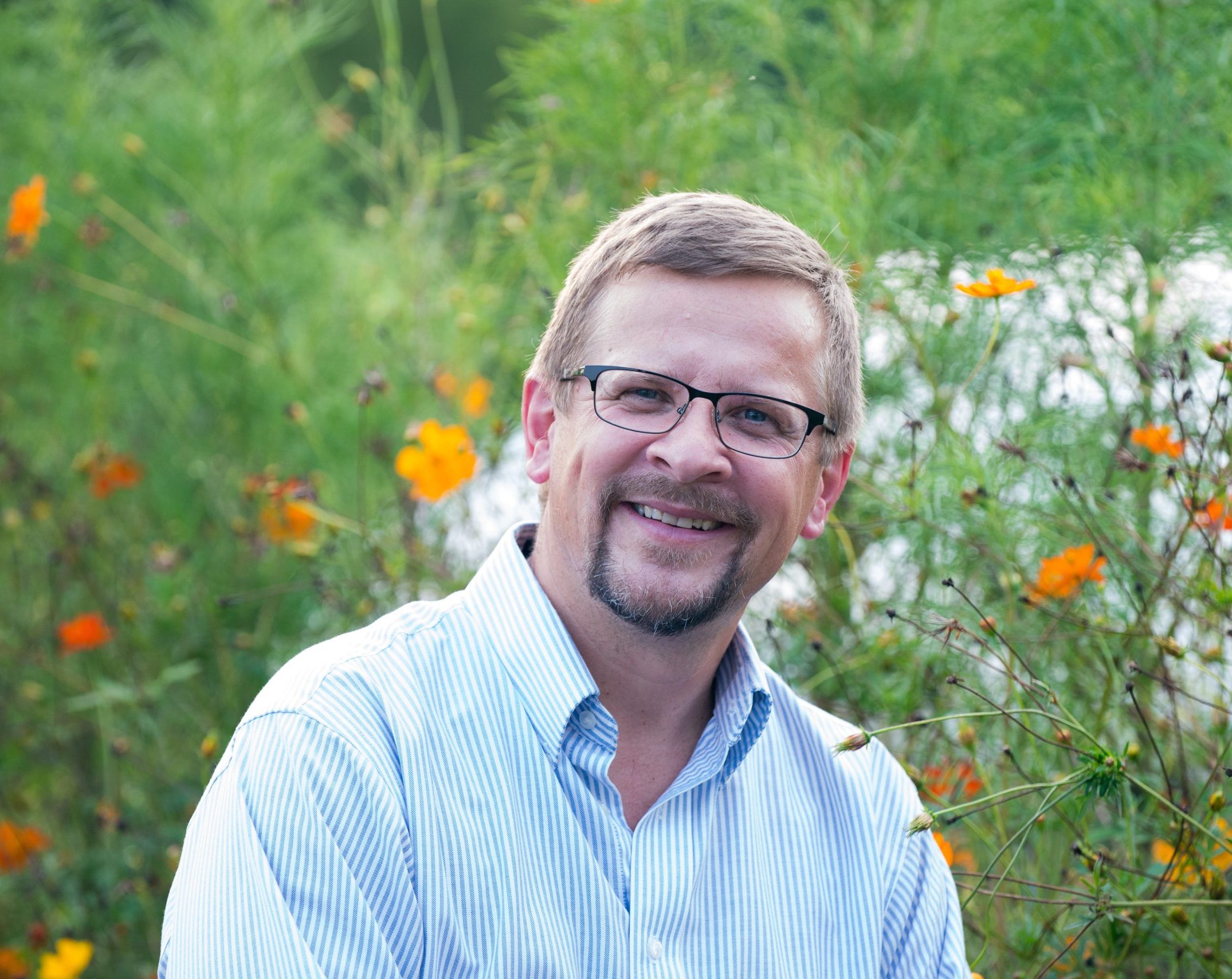
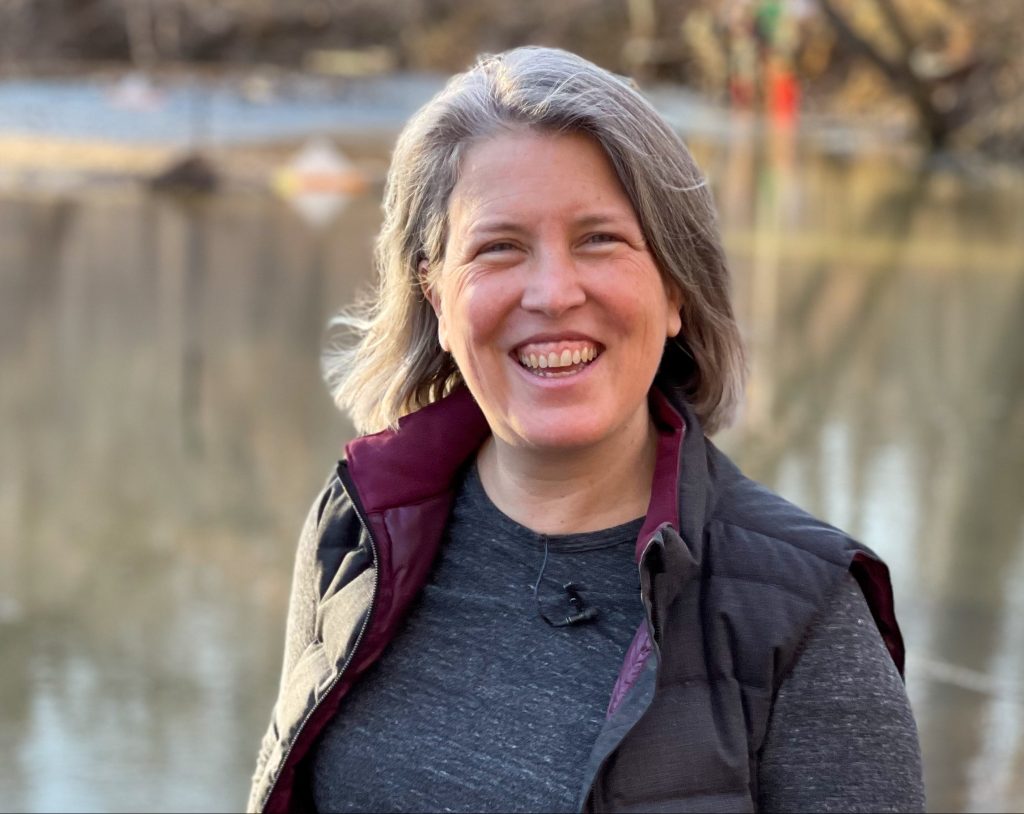
Climate Change Faculty Fellows
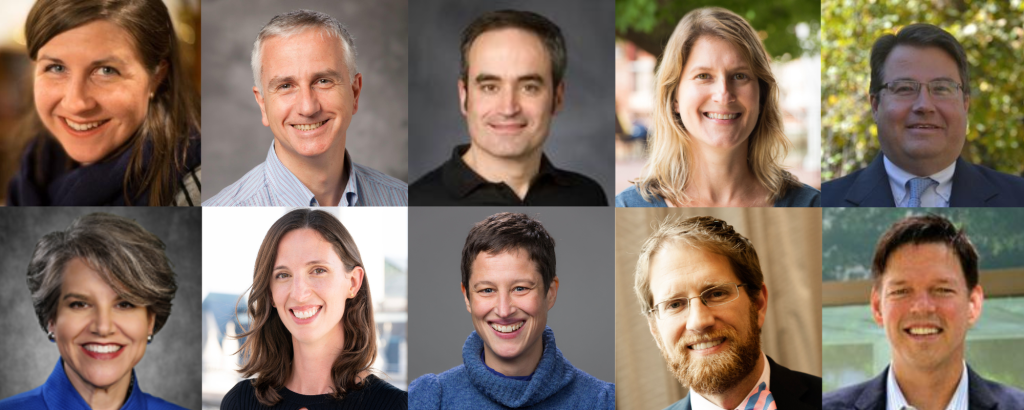
Climate Change Communication Fellows
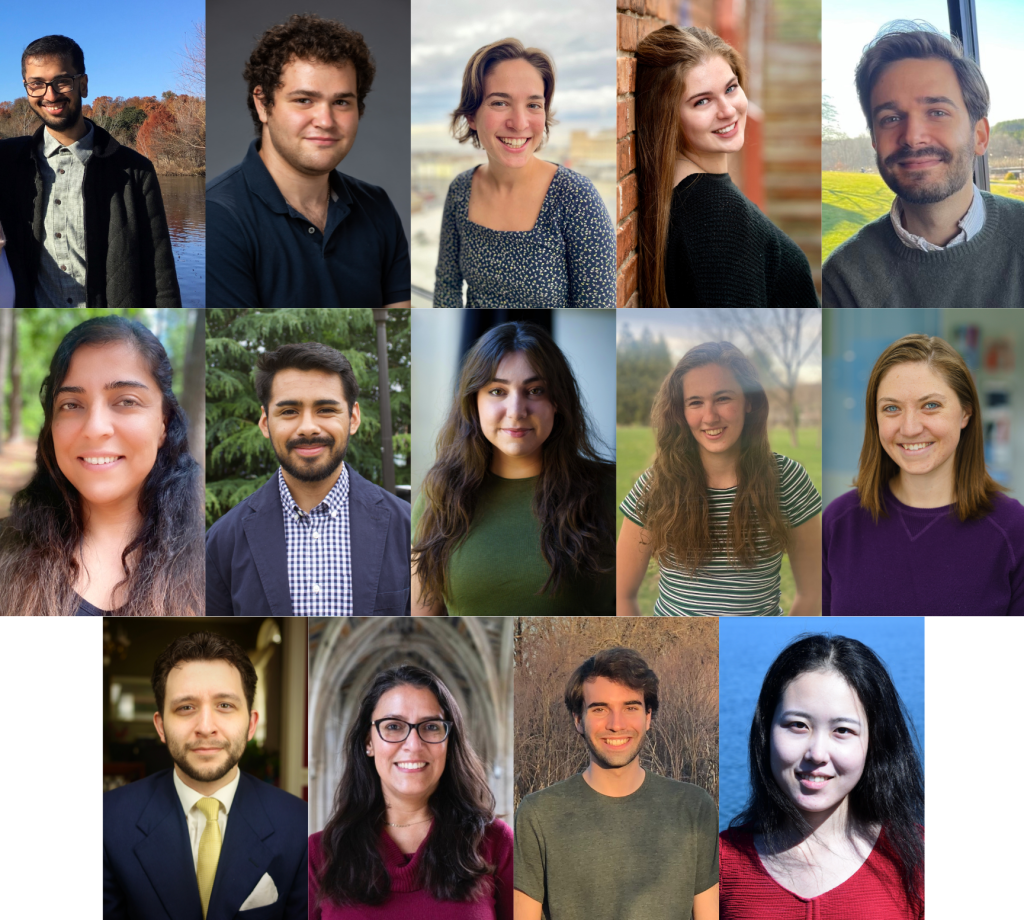
As a cohort, Climate Change Communication Fellows will engage UNIV102 students in small group discussions about climate change.
Archit Guha is in the third year of the PhD program in the History Department, and has interests in the climate and extreme weather phenomena in Modern South Asia and the Indian Ocean region.
Dylan Munson has a background in both economics and the humanities and is currently a PhD student in Duke’s environmental policy program. He is interested in modeling community adaptation policies to better understand how individuals and institutions can protect themselves against disruptions due to climate change.
Emily Klein is a Master of Global Health Student whose research focuses on understanding how environmental issues, such as air pollution and changes to the natural environment, impact human health.
Hannah Medsker, a Master of Science in Global Health student, is most interested in using creative communications to promote health equity across global socioeconomic and geoenvironmental divisions. She works part-time as a professional artist, and used this skillset to lead a project that has educated thousands of people on the United Nations Sustainable Development Goals.
Jake Webb is a Master of Divinity Student at Duke Divinity School pursing the Certificate in Anglican Studies. His interests lie in theological anthropology and ethics, with a particular focus on rethinking human agency in light of the Anthropocene.
Jennie Bahramian is a first-year Ph.D. student at Nicholas School of the Environment. For her Ph.D. research, she is interested in understanding the dynamics of wetland ecosystem carbon sequestration and how land management strategies can help mitigate the negative impact of climate change in the most vulnerable communities.
Joseph Rodriguez is a PhD student in Political Science. His research interests lie broadly in normative political theory, constitutional design, and jurisprudence.
Julia Piper is an educator and choreographer investigating the social dimensions of environmental issues through performance and movement. She is a student in Duke Dance Program’s MFA Embodied Interdisciplinary Praxis.
Katryna Niva is a second year PhD student in the Earth and Climate Sciences Department. Her research focuses on open ocean and coral reef biogeochemistry where she is examining metabolic and nitrogen fluxes at a high resolution in order to understand the relationship between shifting environments, biological behavior, and nutrient cycles.
Kiera O’Donnell is a sustainability scientist focusing how social-ecological systems respond to climate hazards such as hurricanes and flooding. She currently runs a research coordination network focused on synthesizing and sharing information about saltwater intrusion and sea level rise.
Matthew Alexander is a Master of Liberal Studies student who studies the intersection of media and performance through an artistic lens.
Michelle Jones is a Master of Arts candidate in the Graduate Liberal Studies program. She is interested in climate change, de-colonizing conservation and traditional ecological knowledge in Indigenous cultures.
Spencer Rhea is a second year Ecology PhD student studying biogeochemistry in freshwaters. His research seeks to understand how sea level rise and saltwater intrusion causes forest loss in coastal wetlands and the consequences for greenhouse gas emissions.
Yiqun Tian is a third-year Earth and Climate Sciences PhD student. Her research focuses on mechanisms of tropical ocean warming pattern formation.
Outline
| Discussant | Conversation Starter |
|---|---|
| Norman Wirzba, Gilbert T. Rowe Distinguished Professor of Christian Theology and Senior Fellow at the Kenan Institute for Ethics & Emily Bernhardt, James B. Duke Distinguished Professor of Biogeochemistry and Chair, Department of Biology |
An essay by Margaret Atwood “It’s Not Climate Change – It’s Everything Change” Please watch: A TED talk by Katharine Hayhoe “Let’s Talk About Climate Change” |
| Dr. Naomi Oreskes. Professor of the History of Science, Harvard University | Please watch Climate Change and the Promise of Progress Found at this LINK(scroll to bottom of page) |
| Emily Bernhardt is the James B. Duke Distinguished Professor of Biogeochemistry and Chair, Department of Biology | |
| Valerie Sabol, PhD, MBA, ACNP, GNP, CNE, ANEF, FAANP, FAAN is the Interim Vice Dean for Academic Affairs at the Duke University School of Nursing (DUSON) and is certified as both an acute care and gerontology nurse practitioner. | |
| Torry Bend, MFA, is a Professor of the Practice of Theater Studies. | |
| Amy Schmid is David M. Goodner Associate Professor in the Department of Biology. | |
| Maurizio Forte is William and Sue Gross Distinguished Professor of Classical Studies Art, Art History, and Visual Studies at Duke University. | |
| Jose Maria Rodruiguez-Garcia is Associate Professor of Romance Studies and the creator of two Spanish courses, cross-listed with Art History, which foreground the socioeconomic and political dimensions or artistic styles, or as philosopher Jacques Rancière would say, courses that invite students to entertain possible correlations between “aesthetic regimes” and “political regimes.” | |
| Cameron Wolfe is a Professor of Medicine, in Infectious Disease. | |
| Dr. Kyle Powys White is a faculty member at the University of Michigan where he is George Willis Pack Professor in the School for Environment and Sustainability, University Diversity and Social Transformation Professor, and Professor of Philosophy in the College of Literature, Science, and the Arts. | |
| Kerilyn Schewel is the co-director of the Duke Program on Climate-Related Migration and a lecturing fellow at the Duke Center for International Development. | |
| Dan Vermeer is an Associate Professor of the Practice at Duke University’s Fuqua School of Business, where he leads the Center for Energy, Development, and the Global Environment (EDGE). | |
| Liz Kalies is the Lead Renewable Energy Scientist for the North America region of The Nature Conservancy (TNC), and an adjunct associate professor at the Nicholas School of the Environment. | |
| Ryke Longest is the Director of the Environmental Law and Policy Clinic and a Clinical Professor of Law at the Duke University School of Law | |
| ALL STUDENTS | “Let’s Talk About Climate Change” Gallery Walk – every student will share their own ‘conversation starter’ |
“UNIV102 Presents” Signature Event
UNIV102 hosted one signature event during the 2023-2024 academic year. This event was complementary to the course, free of charge, and open to the general public. No Duke affiliation required.
Let’s Talk About Environmental Justice with Dr. Kyle Powys Whyte: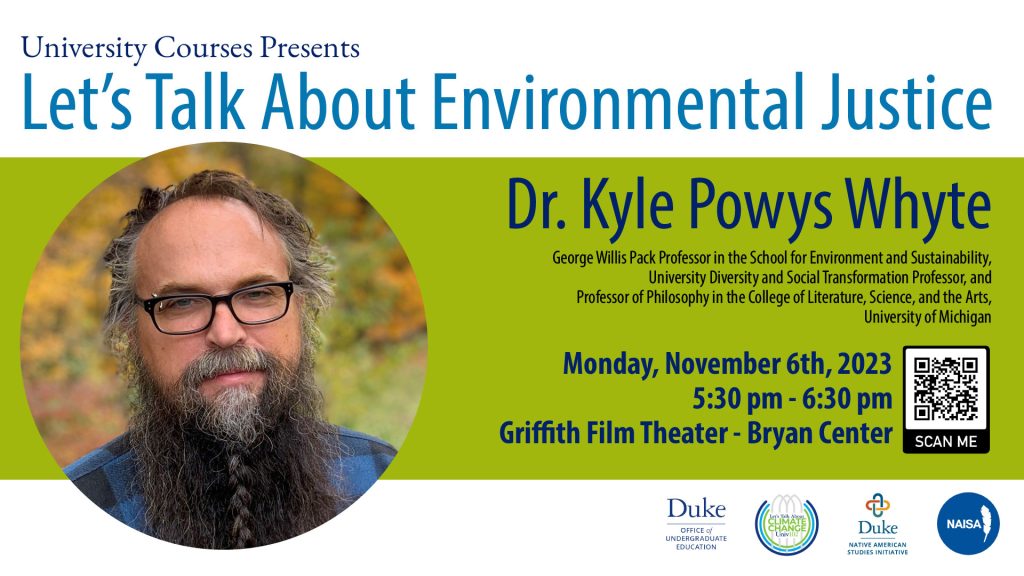
Dr. Kyle Powys Whyte’s lecture will focus on his recent research and organizing work on Indigenous conservation and climate justice, U.S. policy projects on environmental justice and Justice40, and new Indigenous rights and diplomacy initiatives internationally on environmental, climate, and scientific issues.
Kyle is a faculty member at the University of Michigan where he is George Willis Pack Professor in the School for Environment and Sustainability, University Diversity and Social Transformation Professor, and Professor of Philosophy in the College of Literature, Science, and the Arts. Kyle teaches in the SEAS environmental justice specialization. He is founding Faculty Director of the Tishman Center for Social Justice and the Environment, Principal Investigator of the Energy Equity Project, Faculty Associate of Native American Studies, and Senior Fellow in the Michigan Society of Fellows.

